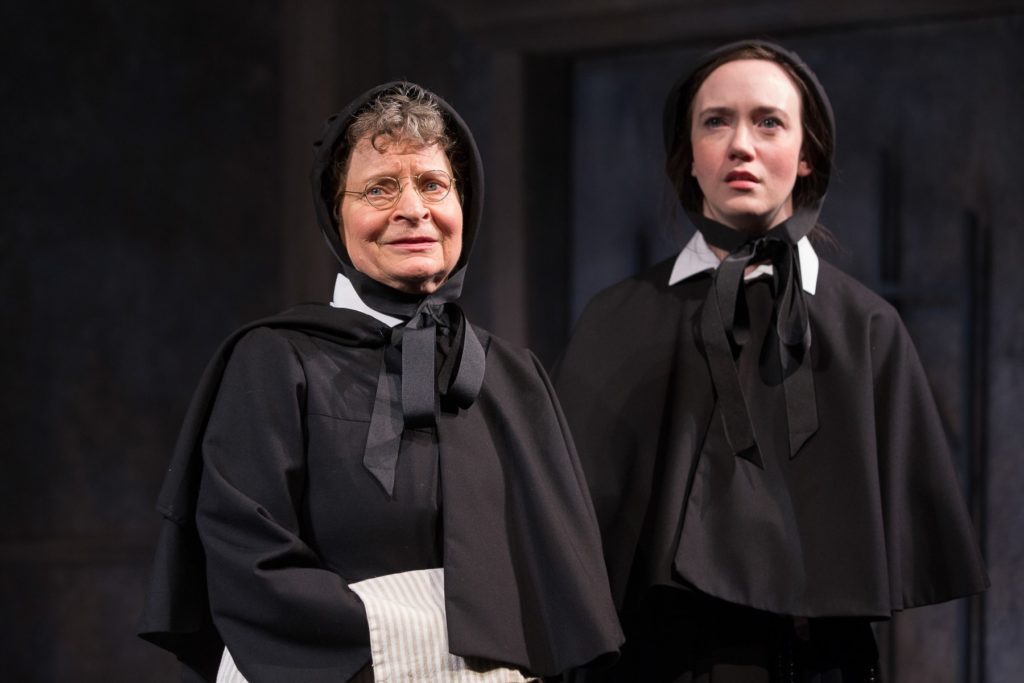The Actress at the Center of ‘Doubt’
By • October 8, 2019 0 1068

Man or woman, black or white, gay or straight, youngish or oldish, religious or not-so-much — whatever and whoever you are, you will be touched, rankled, pricked into sitting up straight and engaging with Studio Theatre’s production of John Patrick Shanley’s provoking, contrarian, punch-packing play “Doubt: A Parable.”
“Doubt” is not so much a parable as it is a four-cornered debate about the way we lived then (in the post-Vatican II 1960s), in the 15-years-ago world when it first hit the stage and in the times we live in today, when perceptions and definitions of truth touch everything.
The story — steered with a steady, clear hand to a rending and emphatically ambiguous end by director Matt Torney, Studio’s associate artistic director — is presented without intermission on a sparse stage, loaded up, however, with invisible moral, historical and emotional baggage.
Set at the fictional St. Nicholas Church School in the Bronx in the liberating aftermath of Vatican II reforms in the Catholic Church, it has as its protagonists the school’s proudly and indefatigably stern principal Sister Aloysius; a young and eager-to-teach nun, Sister James; a charismatic priest and teacher, Father Flynn; and the mother of one of the students, a young boy (and the school’s first black student), whom the principal suspects of being molested by Flynn.
Sister Aloysius, played with a determined, no-nonsense flintiness by Sarah Marshall, is convinced that the priest, under the guise of kindness and protectiveness, is taking advantage of the boy, who is never seen. Sister James is somewhat in awe of the charismatic Flynn, who uses his considerable charm, intelligence and will to try to combat the principal’s suspicions. The boy’s mother is equally protective of her son and, even more, his future.
The play has a kind of whiplash effect on the audience. It is, for instance, set in a different time than the one we have now; we’re imbued with the knowledge of the Church and its attempted cover-up of a massive sexual abuse scandal in recent years, and that knowledge can’t help but color how we see things. In a way, we inhabit the viewpoint of Sister James and her anguish that the abuse might be true, and wish it otherwise, but we’re also betrayed by the knowledge that it could be (and has been) true.
There’s nothing codified or simple here, and what holds it all together is Marshall’s Sister Aloysius, aided by Christian Conn as Flynn, Amelia Pedlow as Sister James and Tiffany M. Thompson as the boy’s mother. Marshall embodies scowling certainty — in her combat with Flynn, in the many times she’s asked “Are you certain?” by her younger counterpart. The answer always is an emphatic “Yes!”
But this is a play about the perils of certainty, and truth. After all, the title is “Doubt,” not “Yes!” In Marshall’s portrait of the principal, those conflicting forces reach out to the audience. You don’t like the good sister, her sardonic sense of humor, her unwillingness to back down an inch. It’s a dilemma that Marshall turns into the revelation of a human being.
Marshall is pacing a familiar stage in “Doubt.” Having performed at Studio Theatre more than any other actor, under founding Artistic Director Joy Zinoman and current Artistic Director David Muse, she is as much a regular as an actor can be in one company.
She remembers arriving at Studio soon after it was founded. “I came to D.C. in 1979 to study with Joy Zinoman. The school was in a townhouse on Rhode Island Avenue and I lived at 14th and Corcoran,” she says. “I have watched that neighborhood transform over 40 years.”
She calls Sister Aloysius “such a tough cookie.” “She reminds me of my parents, of that generation of tough love and ‘Children should be see and not heard.’ I adored my parents. I grew up in a Catholic military family, so I have some of her levels of discipline and an understanding of Catholicism already in me. I appreciate her tenacity and her morality. She is over the top in some ways, but, actually, we could use a bit more of her ethics and discipline in our leaders.”
Asked why “Doubt” is called a parable, she demurs. “I think that’s for an audience to decide … I have my own experience of it at times. I have lines like ‘Liars should be frightened to lie to you.’”
Now a Georgetown resident, Marshall teaches acting at Georgetown University and at Duke Ellington School of the Arts. “The students seem more and more thoughtful to me. And vulnerable,” she says. “I just finished class and was thinking this … that they will bring open hearts to the world and the work. They seem kinder in some way than students of the past. This is a very good thing, I think. Especially in the world today.“
In this production, it’s Marshall who manages to, in the end, achieve a transformation from cliché to the heart beneath the black uniform of a nun, making us look at ourselves. About that, there is no doubt.

